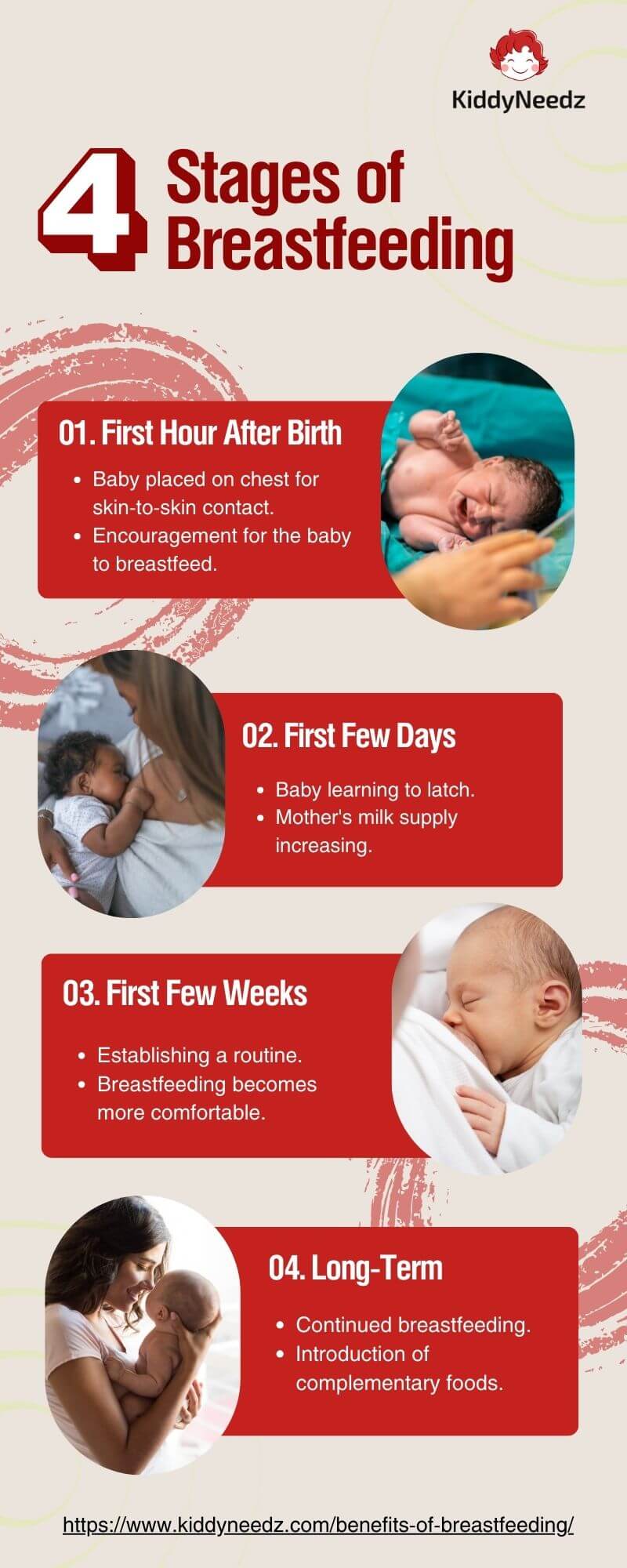Breastfeeding is one of the most important and beneficial things a mother can do for her newborn baby. Not only does it provide the best nutrition for infants, but it also offers numerous health benefits for both mom and baby. Breastfeeding is a natural and essential process that helps to build a strong bond between mother and baby. Apart from that, there are numerous other benefits of breastfeeding that we will discuss here.
As a new mom, you might have a lot of questions about breastfeeding, such as why it is important, the benefits of breastfeeding, how long you need to breastfeed, and what the health benefits are for both you and your baby. In this article, we will answer all your questions and provide you with actionable insights to make breastfeeding easier for you and your baby.
Breastfeeding can be challenging, but with the right information and support, you can successfully breastfeed your baby and provide them with the best start in life. So, if you are a new mom who wants to learn more about breastfeeding and its benefits, keep reading till the end.
Table of Contents
What is breastfeeding?
Breastfeeding is the act of feeding a baby milk from the mother’s breast.
Breast milk provides the ideal nutrition for infants and offers numerous health benefits for both mother and child. It contains all the essential nutrients that a baby needs for growth and development, including protein, fat, carbohydrates, vitamins, and minerals.
Breast milk also contains antibodies that help protect the baby from infections and illnesses. Breastfeeding is a natural and beneficial way to nourish a baby and establish a special bonding relationship between mother and child.
Healthcare professionals advise breastfeeding for the first six months of a baby’s life and continuing it for at least a year or longer, if both the mother and the child so desire. This will allow both to get the maximum benefits of breastfeeding for a long period of time.

The Importance Of Breastfeeding
Breastfeeding is the most natural and ideal way of feeding a baby. The benefits of breastfeeding go beyond just providing nutrition. Here are some reasons why breastfeeding is important:
- Nutritional benefits: Breast milk provides all the necessary nutrients for a baby’s growth and development. It contains the perfect balance of proteins, fats, vitamins, and minerals needed for the baby’s growth and development.
- Immune system benefits: Breast milk contains antibodies that help protect the baby from infections, allergies, and other illnesses. This helps boost the baby’s immune system, making them less susceptible to diseases.
- Emotional bonding: Breastfeeding helps create a special bond between the mother and baby. The skin-to-skin contact and the act of nursing help release hormones like oxytocin, which promote feelings of love and bonding.
Overall, breastfeeding is an important way to ensure a baby’s optimal health and development. It is recommended that infants be exclusively breastfed for the first six months of life, with continued breastfeeding until at least 12 months of age.
the four stages of breastfeeding
Breastfeeding can be broken down into four stages:
- Stage 1: The first hour after birth, when your baby is placed on your chest for skin-to-skin contact and encouraged to breastfeed.
- Stage 2: The first few days, when your baby is learning to latch and your milk supply is increasing.
- Stage 3: The first few weeks, when you and your baby are getting into a routine and breastfeeding becomes more comfortable.
- Stage 4: The long-term, where you continue to breastfeed and introduce complementary foods as your baby grows.

Each stage of breastfeeding is important for the baby’s growth and development, and the composition of breast milk changes to meet the baby’s changing needs.

Benefits of breastfeeding for the baby
Breastfeeding is widely recognized as the optimal way to feed an infant due to the numerous benefits it provides. Here are some of the benefits of breastfeeding for the baby:
- Breast milk contains all the essential nutrients that a baby needs for optimal growth and development.
- Breast milk contains antibodies and other immune factors that protect babies from infections and illnesses, such as ear infections, respiratory infections, and gastrointestinal infections. Overall, it helps build a strong immune system.
- Breastfeeding also helps protect against allergies and intolerances, as breast milk contains substances that can prevent allergic reactions.
- Breastfeeding is associated with a lower risk of sudden infant death syndrome (SIDS).
- Breastfeeding is linked to a reduced risk of developing chronic conditions later in life, such as obesity, type 1 and 2 diabetes, and asthma.
- Breastfeeding has been shown to have positive effects on cognitive development, leading to higher IQ scores and improved academic performance.
- Promotes healthy weight gain and reduces the risk of obesity later in life.
- Enhances bonding and creates a special connection with the mother.
Benefits of breastfeeding For the mother
Breastfeeding is not only beneficial for the baby, but it also offers many advantages for the mother. Here are some of the benefits of breastfeeding for the mother:
- Breastfeeding triggers the release of hormones that promote maternal bonding and emotional attachment to the baby.
- It releases a hormone called oxytocin that helps the uterus return to its pre-pregnancy size more quickly.
- Breastfeeding can help reduce the risk of postpartum depression.
- Breastfeeding has been shown to reduce the risk of breast and ovarian cancer, as well as type 2 diabetes, heart disease, and osteoporosis.
- Breastfeeding can help women lose weight and return to their pre-pregnancy body shape.
- Breastfeeding can also provide economic benefits by reducing healthcare costs associated with infant illnesses.
- It saves time and money compared to formula feeding.
Furthermore, the emotional bond that develops between mother and baby during breastfeeding can have positive effects on the child’s mental health and well-being throughout their life. We think that this is one of the most important benefits of breastfeeding overall.
How long do you have to breastfeed to get the benefits?
Breastfeeding provides both short-term and long-term health outcomes for both the mother and the baby, regardless of how long you breastfeed. However, the World Health Organization recommends that infants be exclusively breastfed for the first 6 months of life, with continued breastfeeding alongside the introduction of complementary foods until at least 12 months of age.
Research has shown that breastfeeding for any amount of time can be beneficial. Even a short period of exclusive breastfeeding, such as a few days or weeks, can provide important health benefits to the baby. The longer a mother breastfeeds, the more she and her baby will continue to benefit.
It’s important to note that every mother and baby’s breastfeeding journey is unique, and it’s okay if your breastfeeding experience doesn’t go exactly as planned. The important thing is to seek support and guidance from a lactation consultant or other breastfeeding professionals if you need it.

Recommendations of WHO and UNICEF
Breastfeeding is not only beneficial for both the mother and the baby, but it is also a natural and convenient way to feed the baby. The World Health Organization (WHO) and the United Nations Children’s Fund (UNICEF) provide recommendations on breastfeeding that are aimed at promoting the health and well-being of both the mother and the child.
According to the WHO and UNICEF, infants should initiate breastfeeding within the first hour of birth and be exclusively breastfed for the first six months of life. During this time, no other foods or liquids, including water, should be provided to the infant. This means that breast milk is the only source of nutrition for the infant during the first six months.
It is also recommended that infants be breastfed on demand, which means that the infant should be fed as often as they want, day and night. This helps to ensure that the infant gets the necessary nutrients and helps establish the mother’s milk supply.
In addition, the WHO and UNICEF recommend that infants should not be given bottles, teats, or pacifiers during the first six months of life. This is to avoid nipple confusion, which can make breastfeeding more challenging and may lead to early weaning.
After six months, infants should begin eating safe and adequate complementary foods and formula feeds while continuing to breastfeed for up to two years and beyond. Complementary foods should be nutritionally adequate and safe and should be given in addition to breast milk.
By following these recommendations, mothers can provide their infants with the best possible start in life by giving them optimal nutrition and promoting their overall health and well-being.

Conclusion
In conclusion, breastfeeding is crucial for the health and well-being of both the mother and the baby. Breast milk provides optimal nutrition for the baby, as well as immune system benefits and emotional bonding between mother and baby. For mothers, breastfeeding can reduce the risk of certain health conditions and help with postpartum weight loss.
It is recommended that babies be breastfed exclusively for the first six months of life, with continued breastfeeding along with complementary foods for up to two years and beyond. While breastfeeding can present some challenges, with the right support and resources, it can be a rewarding and fulfilling experience for both mother and baby.
We encourage all new mothers to consider breastfeeding as the best option for their babies and to seek out additional resources and support if needed. Some organizations that can provide you with support for breastfeeding are listed in the next section.
Additional resources
Here are some additional resources and support for breastfeeding moms:
- La Leche League International: A nonprofit organization that provides education, information, support, and encouragement to women who want to breastfeed.
- International Lactation Consultant Association: A global network of certified lactation consultants who provide education, support, and clinical expertise to breastfeeding families.
- Breastfeeding USA: A volunteer-led organization that provides evidence-based information and support to mothers who want to breastfeed.
- National Breastfeeding Helpline, UK: A free service that offers counseling and support to breastfeeding mothers, provided by trained counselors.
- National Women’s Health and Breastfeeding Helpline, USA: The trained breastfeeding peer counselors who work for this toll-free service are available around the clock and can provide advice and support to mothers who might be having problems breastfeeding or have questions about breastfeeding.
- The Breastfeeding Promotion Network of India (BPNI): It is a national organization in India that advocates for and promotes breastfeeding practices.
Apart from these, your doctor, midwife, or nurse can provide guidance and support on breastfeeding and may be able to refer you to a lactation consultant if needed.
By utilizing these resources, you can get the help and support you need to successfully breastfeed your baby.






Leave a Reply